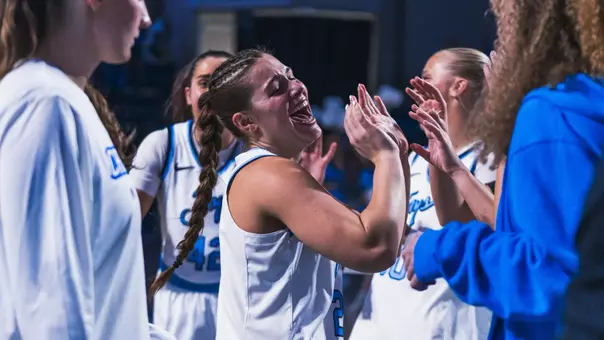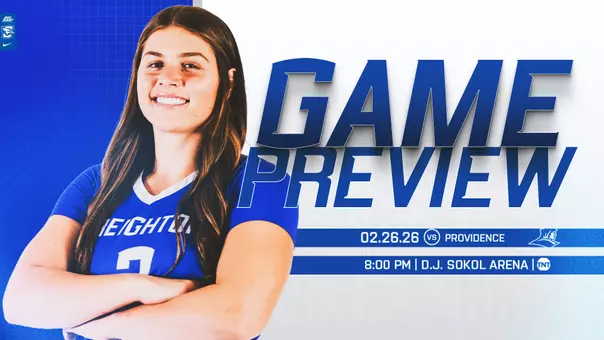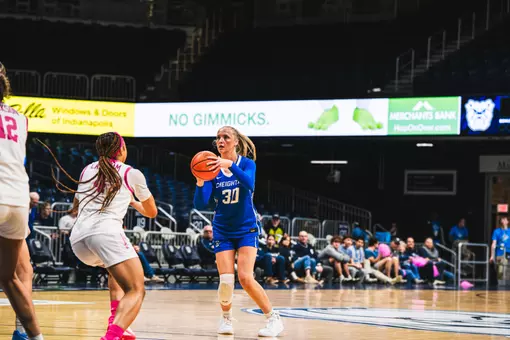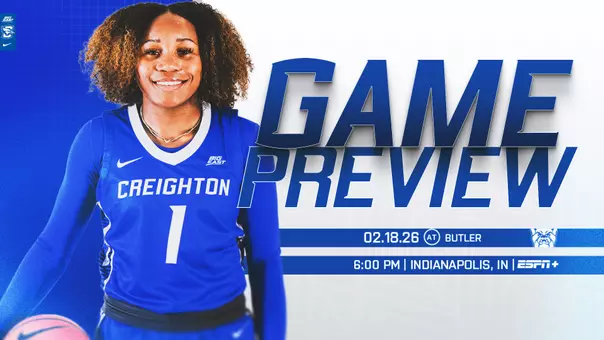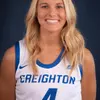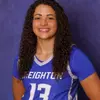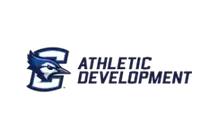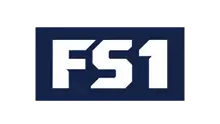Women's Basketball Gears Up For Showdown With #1 South Carolina
3/26/2022 4:30:00 PM | Women's Basketball
More media interviews, plus another practice in Greensboro
Day four of Creighton's trip to Greensboro featured another 30 minutes with the media (15 minutes with Creighton's starters, followed by 15 minutes with Jim Flanery), followed by a closed practice inside Greensboro Coliseum as the Bluejays prepped for Sunday night's showdown vs. #1 South Carolina. You can read a preview for Sunday's game HERE.
Creighton Bluejays (Tatum Rembao, Payton Brotzki, Lauren Jensen, Carly Bachelor, Emma Ronsiek, Jim Flanery)
Elite Eight Press Conference
THE MODERATOR: We welcome the Creighton Bluejays. It is my pleasure to introduce Creighton student athletes. We have Tatum Rembao, Payton Brotzki, Lauren Jensen, Carly Bachelor, and Emma Ronsiek.
Q. Tatum, I'm curious about deciding to come back for this fifth year and what it meant to you. And for everyone else, what does Tatum's leadership and experience bring to this team?
TATUM REMBAO: It was an easy decision to come back. Obviously last year was pretty difficult for a lot of different people, and I struggled with injuries back-to-back-to-back.
So I decided early on to come back. All the credit to my be strength coach and our athletic trainer. They really put me through it this last summer just making sure that my body was as healthy as it could be.
Q. Tatum, you guys kind of run people into each other a lot. Like Morgan did that -- I'm guessing Morgan is right behind me. Like Morgan did yesterday. Is that a conscious effort to get defenders to run into each other and use the screens?
TATUM REMBAO: Yes and no. It's part of our offense. The motion, we have a lot of freedom, like I said yesterday. And Morgan, Lauren, Emma, they're going to have types of players that are going to hug them, so back cutting happens to be their best option sometimes.
Q. I read that someone jumped in the stands after the win. I don't know if it was one of you guys or if they're in this room. If it was one of you guys, just the decision to do that? What you saw from that?
EMMA RONSIEK: I think that was Rachael Saunders, right there. (Laughter.) I don't know what was going through her head when she did that.
Q. Payton, how do you see this match-up? Do you see it as an insurmountable hill, or is what you have done already enough proof that you guys deserve to be here and can play with anybody?
PAYTON BROTZKI: I think what we have done already proves that we can be here. It's obviously a tough task, but I think we can trust in our preparation, our coaching, and just the faith and confidence we have in each other to be ready for this game tomorrow.
Q. Lauren, obviously a lot of us are just kind of getting to know the stories of all of you because you're in the national spotlight. I know you transferred. What was it about Creighton that made you choose to come here? And if anyone else wants to share what made them choose this school and this program, I'm very curious.
LAUREN JENSEN: Yeah, coming out of high school they recruited me, and I had a good relationship with the coaches. I played with Mallory Break, who is also from Minnesota, and Temi Carda from last year played at my high school.
So I was familiar with the program. I felt comfortable. I knew the culture was great and I liked the style of offense, so it seemed like the right fit.
EMMA RONSIEK: I just knew this was a school for me when I was being recruited in high school. I was recruited by some of the local schools in South Dakota, but I knew I wanted to get away and this was the perfect fit for me.
CARLY BACHELOR: I think the chemistry, all the teams that Creighton have is so special and it carries over year-to-year. I think this year how far we have come is a testament to how close we are and just the amazing teammates and people and friends that I will have for life that make basketball fun, but also are so great off the court as well.
PAYTON BROTZKI: I chose Creighton because it's 20 minutes from my hometown, so obviously knew I wanted to stay close to home. It was ultimately the people that brought me there.
College basketball is crazy being recruited for all this time, so I got to meet a lot of people and see a lot of different places, but the people at Creighton were what ultimately drew me there in making my decision.
TATUM REMBAO: Just echoing what everyone else said: The community and the people. Just the fan base that Creighton draws really is the reason why I chose Creighton.
Q. I don't think South Carolina is going to come out here with their whole team. It seems like you guys are together and have talked about that. I wondered if you had any specific stories that you could give us to illustrate how together this team is.
PAYTON BROTZKI: I think something -- this is not really basketball related, but we have a trip planned in May to Florida, and literally the whole roster is going, the whole entire team.
That's something we planned probably two months ago, so it's been in the works. It just shows that we really do enjoy being around each other on the court and off the court and I think that contributes to our success.
TATUM REMBAO: Just the story of them wanting to come in here. There was three of four of them and they were like, oh, can we go watch this press conference? And the five of us were like, oh my gosh, what is this going to entail?
It really just goes to show that we love being around each other and love supporting each other.
Q. Tatum and Payton, as the veterans up there, what is it about this team in particular, whether it's chemistry, the way you guys have come together, that is different from the other teams you've been on that have allowed you to get to this not point?
TATUM REMBAO: It's the youth and it's the energy. Every single day everyone comes to practice with such a smile on their face and just ready to get after it. It makes it a lot easier for us seniors to come to practice and be excited about coming to practice every day as well.
PAYTON BROTZKI: I think we have a really good balance of young talent and then also older and wise leadership. Our three leading scorers are sophomores, which is kind of crazy. You don't see that every single day.
But I think it comes with the bond that we have with those girls and the trust that he have with them to make plays when it's needed, and then just using me Tatum's and even Carly's leadership and experience that we have had throughout our three and four years in this program. Really helps a lot.
Q. For Tatum and Emma. I'm wondering if the energy, the dynamic, if anything changes at this point, because the first three wins in the tournament you advanced to the next round. Now we're talking about going to the Final Four. Does it feel different at this moment?
TATUM REMBAO: I would say no, it doesn't feel any different. I know for me personally, the next game could always be my last game, and I'm not ready for the last game to be my last game.
EMMA RONSIEK: Yeah, I mean, it's all a surreal feeling that we have made it this far and we have had this belief in ourselves the whole season.
We knew we could prove to everyone that this is where we belong, and we don't want the season to be over for the seniors especially because we have had such a great season. We don't want to be done hanging out with each other and this team, so we want to go as long as we can.
Q. Yesterday your coach said you guys play a little bit different than everyone. How would you describe your playing style? How do you think it benefits you in this tournament?
CARLY BACHELOR: Well, first off, you look at a lot of teams and there is usually someone above 6'2" or 6'3", and clearly we don't have that. We're probably averaging around 5'8" height between all of us. I think that's pretty unique of teams that have made it this far.
But I also think that's a strength of ours, being able to be so -- such a five-out team and not having to rely on size and just everybody being able to shoot and cut and score. I think it makes our motion offense so fluid and makes it easier for us to all get involved.
Q. When you look at Aliyah Boston, what is the most challenging thing about her when you look at how you're going to defend her?
EMMA RONSIEK: Definitely her size and her strength, and obviously being -- shooting such a high percentage from the field. She is just a big body, and it's going to be a challenge for us, because we are -- like Carly said, we're a little undersized in the center category, I would say.
But we just gotta believe in each other and just tackle it.
CARLY BACHELOR: Aliyah Boston is a phenomenal player. There is not much more to be said about that. Obviously she is super talented and has gotten her team to this point.
I think the biggest thing for us is just limiting offensive rebounds and trying to pack the paint as well as we can and keep her off the boards.
Q. Echoing on the themes that we have touched on for Emma and Tatum, you guys are different than most teams in the tournament left. You don't have a superstar leading the team every single night and scoring. You are a true team. How does that dynamic work when you know on any given night there can be somebody different stepping up to lead the way?
TATUM REMBAO: I think it makes it difficult for teams to scout us, because obviously when you have a team that has one or two dynamic scorers you're going to put your best defenders on them.
So when you have a team like us where there can being four or five different scorers, it's harder to pick and choose who you are going to put your best defenders on.
EMMA RONSIEK: It's hard to guard us when you don't know who is going to be the go-to girl that night. Obviously Morgan had a great game yesterday, and it's not like Iowa State didn't know she wasn't a great shooter and a great player, but they just can't have enough defenders to guard everyone on our team.
So I think that's hard to scout.
Q. The game ended late, it was a quick turn-around. What does that look like? What has been the response? Has it sunk in? Were you able to sleep any?
LAUREN JENSEN: It's definitely a late night, just that excitement of making it to the Elite Eight. It was definitely hard to fall asleep last night and there is excitement there being less than twelve hours removed from the game.
But I think we're locked in and ready to move on to South Carolina.
CARLY BACHELOR: Nothing that a little melatonin won't fix.
EMMA RONSIEK: Yep, melatonin. (Laughter.)
Q. This year it always comes up about the make-up for women's basketball teams. You have a great thing going with Coach Flanery. Does it make a difference for a man or a woman coaching a team?
TATUM REMBAO: Flan is amazing. He's really good at the X's and O's and our assistants are really good at the communication. They're younger so they're able to relate to us a little more. I think that balance is really good for us to be able to trust in Flan and also trust in our assistant coaches.
PAYTON BROTZKI: Echoing on the balance that we have on our coaching staff. Flan says they don't come to me is what he says when we have problems, they go to our assistant coaches, the women on our team that we can relate to that have been in our position more recently.
But Flan is by far the smartest basketball coach I have ever played for. The way we scout, the way we put our time into the opponents that we are playing, it's all him. I think that is why we're able to win the games that we have won.
LAUREN JENSEN: Yeah, I don't think it really makes much of a difference, kind of like Payton and Tatum said. There is just a lot of balance on the coaching staff.
Flan is a great leader and he knows what he's doing basketballwise. He knows a lot and he's super wise.
CARLY BACHELOR: Not to sound like a broken record, but I think that there is a good balance between Flan and then our younger assistant women coaches. My entire basketball career I've mostly been coached by men as coaches so I don't know much different, but I think that having our assistant coaches, just knowing that they're in the same position as we were and just having that wisdom about them and experience makes it all the more able to come to them about anything and just talk about basketball or life.
EMMA RONSIEK: Yeah, I don't think it really matters when you have a coaching staff like ours. Obviously everyone has so much respect for Flan and what he's done, and he knows what he's doing and he knows what he's talking about and he's gotten us this far.
And then we have a good friendship, relationship with other coaches, and we respect them on and off the court. They're our friends off the court, but they know how to do their jobs when we are on the court.
So that's why we have a lot of respect for them.
Q. You guys have a big game tomorrow. Can you take us a little bit through what's going to go through your mind, what your morning preparation will look like, how you are going to center yourselves?
EMMA RONSIEK: Yeah, I think it's just a matter of we can't get too high or too low. Obviously this is going to be a tall task, and South Carolina is obviously a really good team. They're a talented team, well coached.
We have to stay within ourselves and believe that we can do it.
CARLY BACHELOR: Yeah, I mean, at this point every team that we're playing is really good. It's just the seeding that's different. So I think just trying to keep that mind-set of we made it this far. Why not us?
LAUREN JENSEN: I feel like we've done a good job so far of staying within us and not trying to let the outside noise or the pressure of the big games get to us and play our game. I feel like that will be key for us tomorrow.
PAYTON BROTZKI: I think our past two games have been good experiences leading up to these games. We have never played in front of a 15,000 sold-out crowd until we played at Iowa and then the atmosphere last night. I think that will take our momentum into the game tomorrow, and we will be ready.
TATUM REMBAO: I think the preparation for tomorrow morning is staying loose and having confidence in ourselves but also preparing ourselves and knowing that we deserve to be in that game.
THE MODERATOR: Thank you all very much and we will see you tomorrow. Welcome Coach. We are going to roll right into our questions for Creighton head coach, Jim Flanery.
COACH FLANERY: Well, it was a late night. My kids went to bed at 1:45 at the earliest. It's hard to come down from what we've been able to experience the last eight or nine days. I hope our players got a good night's sleep.
And we won't do much today. Maybe a glorified shootaround, get some shots up and a little bit of a walk-through. We know what the challenge -- we think we know what the challenge is for tomorrow night.
We're playing a team that's really, really good defensively and rebounds the heck out of the ball. We've got to do everything we can to make it as competitive from a rebounding standpoint as we can.
That doesn't mean we're going to be even on the glass, but I can tell you from watching them play live in the first game and then coming back out during warm-ups of our game with Iowa State, the contrast between the size of Iowa State's and Creighton's post players and the size of South Carolina's post players was pretty dramatic.
Just seeing that obviously makes that really important. We're going to take some risks and do some things defensively that we wouldn't normally do against teams or have to defend differently because of the size and the rebounding that we have.
But I think we're unconventional enough offensively to create some issues for them. We can invert and have our bigs go out to the three-point line, and hopefully that creates issues for them and opens up the lane to be able to score some points in the paint.
Because, yeah, we're going to have to make some three's to be successful, but we can't just shoot three's. Certainly it's a contrast in styles. It's a monumental task, but we're looking forward to it.
Q. Jim, do you have any connections with Dawn? You have been coaching a similar amount of time. Did you follow how she built the program here?
COACH FLANERY: You know, I really don't have much of a connection. I mean, I followed her since she got in at Temple and the job she has done -- she did a really good job at Temple, and how quickly she built the program at South Carolina from a competitive standpoint and from an interest standpoint.
They kind of ascended -- it's one thing to get good and then later have the kind of interest in the program that they have had. My view from afar is that she built it kind of simultaneously, which I think is a credit to her.
Because I think she -- again, my view from afar is that she kind of gets the whole picture. She is not just a coach or a recruiter or whatever. She gets the -- how does putting, you know, 15,000 people in the building help us? How does that help us recruit? She has done the whole thing.
I know she is really good in the community, and she is one of the most prominent voices in our sport, which is a reflection of what she's built.
Q. Congrats Coach on getting here. Your whole team was in this press conference five minutes ago. We always talk about chemistry. I think we separate it from the chess match of basketball. I was wondering how those two things interact and how the chemistry of this team has helped you prepare for games.
COACH FLANERY: I think that's the magic, right? If we knew exactly what kind of fraction of success is related to chemistry versus X's and O's and skills, all that stuff, we would patent that formula.
I do think our chemistry and the joy that our team plays with and the way that they care about each other plays into -- has played into our success this year.
I always struggle with cause and effect. Are we playing with joy because we're playing well or are we playing well because we're playing with joy? There is obviously room for both, to assign cause and effect to both of those.
But I have had a lot of people comment on how much fun we seem to have when we play, and I think that's been part of our success and why we're here.
Q. Flan, curious about the process of playing two games in three days. Obviously you had a ton of success last weekend; you have this day in between games. How do you manage your time compared to how you manage the team's time and trying to put yourself into the best position tomorrow night?
COACH FLANERY: That's a good question, because I do feel like it's -- it's a physical exhaustion that you're going to have coming out of a game that doesn't get over until close to midnight.
But I think the mental exhaustion of the last, like I said, eight or nine days, too, you've got to be careful not to put too much on their plate today and tomorrow. I'm glad the game is a little later.
I usually like games that are earlier because I don't like to sit around all day, but I think in this case it's a good thing for us that it's a later game based on how late we were there last night.
So we won't do a lot of live stuff today, I mean, looking at how much we went through, and I know our players are going to ice bath and need the time to do that and spend some time with their family tonight.
I think you kind of -- at this time it's more the mental. So we will watch a little bit more film, because we have very little time really, or don't want to put the energy into the physical prep, so it's just a little bit more film and making sure that we have a pretty tight game plan put together.
Q. Two-part question. First, I'm wondering whether it means more as an alum to be here on this historic run for your school? Related to that, I'm wondering how you made the decision to get on the women's side and start coaching women's basketball essentially right after your playing days were done?
COACH FLANERY: Your generous calling my playing days, playing days. (Laughter.) Let me tell you a quick story. I have a son who is 12, and when we were about 6 we were at the playground and he was playing with a kid who was about his age.
As 6 year olds do, they kind of brag about their relatives, and so this other kid was bragging about his dad. My son Jackson was like, well, my dad wasn't very good in high school or college but he's really good now, and I was like 50. (Laughter.)
I think now that he's a little older he has a better sense that his dad is not that good now. The first part about -- I don't know any different. I've been at Creighton pretty much forever. Sometimes you struggle to answer that question, because I don't really know what it would be like to coach somewhere other than where I went to school.
I can tell you it means a lot. On the days where it's maybe a little bit more of a struggle it's easier to be invested because it is your Alma Mater, so I think that's maybe how I would answer that.
You let things slide maybe a little bit more that could be irritating because you just -- you have a belief that where you are is the right place to be, and it's the right place -- or it's a great place for young women to have the opportunity to play basketball and grow up.
I got into the women's game -- this is, again -- I was on the college golf team at Creighton, so my college golf coach my last two years was Bruce Rasmussen, who was at that time the women's basketball coach, and that was my ticket in.
I kind of -- I didn't know that I would coach. I kinda wanted to go to law school. I was weird and majored in philosophy and so was kind of tracking toward that.
I just couldn't pull the trigger. I volunteered for Bruce right out of college, and because of my relationship with him, that's how I got into the women's game. Was that both of your questions? Okay, thanks.
Q. You've been head coach now for 20 years. I was wondering, did you think you were going to get here to the Elite Eight? Was this a bucket list item for you? Was this something you would have felt disappointed if you had never gotten here? And what does it mean to get here with this group?
COACH FLANERY: Yeah, I think first of all, our entry into the Big East helped elevate our program and our potential. I think the resources -- we were becoming more resourced as we got late into the days in the Missouri Valley, and I think that's why as an institution we were attractive to the Big East.
But I think it's elevate our recruiting and our ability to train. We have a practice facility now that's much better and we have an on-campus arena that makes more sense for our sport than what we were playing in.
So there has been some headway made that probably made me think this was more achievable and not to give Kirsten, our volleyball coach, too much credit, but she has set a really high bar.
I've officed next to Kirsten. She has been our volleyball coach for 19 years and she has won like ten straight Big East Championships and been to -- - I guess we've only been to nine, so nine.
She is a dreamer, and I think her dream of what is achievable has played with me to some degree and helped me maybe feel like the bar should and can be higher. Like I said with the Big East helping us recruit a little bit better player that's been part of it.
Then you've got to be lucky, right? You've got to win a game that maybe you're not supposed to win, or more than one.
With this team I'm not surprised as I look back, but when we started the year I knew we were pretty sophomore heavy in terms of where our scoring and our production was going to come from. I knew we would be good, but I wasn't quite sure it would be this soon.
Q. When you look at Aliyah Boston, what's the biggest challenge when it comes to preparing how you're going to defend her?
COACH FLANERY: Well, we have to limit her second-chance points and her ability to control the game on the offensive glass. That's the biggest thing. We're going to have to gang rebound. We will not -- in the huddle I will be talking about whether we're doing a good job of having five people on the defensive glass or whether we are not.
If we are, we still may not be successful because she is that big and strong and good around the basket, and we're going to have to cheat some off their perimeter players to help on to her and give some post-to-post help.
I mean, we can't guard her one-on-one and we can't rebound one-on-one against her. We've got to rotate our posts so that they are fresh enough. There are two types of conditioning, running up and down and getting tired running up and down, and then there is just leaning against somebody who is bigger and stronger than you, and that takes a lot out of you, too.
So we can't be playing our posts when they're tired and can't defend in a way that's even worse than when they're fresh. Those are some challenges. She is a good free throw shooter. We can't give her and-one's. I mean, if she has a layup we can't give her three. We've just got to give her two. A lot of challenges.
The other thing is we've got to make her work on the other end. She is going to have to go out and guard on the perimeter at some point, and I think that can be a way to drive down her efficiency.
I look at Czinano in our Iowa game. She missed her last three shots. She had to guard our motion offense for three and a half quarters. One of our philosophies is if we have elite posts we're playing against, we want to try to wear them down on our offensive end.
Q. Jim, this time of year the topic always comes up about men coaching women, whether more women should be coaching women. I know it's your life's work and you're pretty successful at it. Where do you stand on those who say maybe there should be more women, or do you believe you're teaching women to become future basketball coaches?
COACH FLANERY: I think it's hard, because it does seem like if I answer in the way that I maybe feel that I'm being self-serving. I will tell you this: My kids are in elementary school and they're taught by women, and I consider teaching a leadership position. I don't have any problem with them being taught by women.
My kids haven't had -- through elementary school didn't have one male teacher other than music or PE.
I think that's somewhat relevant.
Yeah, I mean, we need to do everything we can to have women coach women, but I think there's -- I applaud the people who have added women to men's coaching staffs. You know, one of the players in our league, Georgetown, Milan Bolden-Morris was just hired by Jim Harbaugh to coach quarterbacks, and I think that's awesome.
I think we're headed down that road. Not nearly as quickly as it needs to happen, but you have seen NFL staffs add females and NBA staffs adding females.
So hopefully that's getting to be the norm and we don't have to talk so much about men coaching women.
Q. Flan, the girls seem like they're having so much fun. You guys as a team seem like it. Why is it important to have fun during that time, especially when it comes to tournament time, and how much importance from a standpoint does that translate to the play on the court?
COACH FLANERY: I've been described as an Irishman with a temper, or a bit of a temper, and I'm not always great about the way I display it.
But we do talk a lot about joy, and I try to get them to understand that that's a big part of being successful and that's why you do it, right? We kind of say, don't kick the joy out of it; keep it in there.
At some point when you are a kid and you "play" okay, it's play. Then all we talk about is well, you gotta work at it. It's work, and it's work, and it's -- and then to me the best thing that you can have is that synthesis of viewing it as both play and work.
Again, if all you focus on is the work and not the play -- and that's why I think our style of play is we let them play. That third quarter I don't know that I called -- really the second half we didn't call almost anything from the bench.
So we're trusting them a lot. I asked them a couple times, hey, what did you want to do on that action that Iowa State is running? What do you guys want to do? I have my ideas, but what do you want to do? I try to empower them because I think that's helpful, too, in creating that.
Q. With the chemistry and the way it manifests on the floor, one area that stands out is your assists game, number one assisted shot rate in the country. What do you think is behind that, and what do you think makes it hard to defend?
COACH FLANERY: Yeah, first of all we have shot makers. You can have a lot of people who can throw good passes but if the ball doesn't go in after the good pass, you don't get an assist for it. I think our kids do spend a lot of time in the gym, and then I think there is a trust. I think Tatum has kind of generated that sort of mentality, too, because she is a pass-first point guard, and I know she scored the ball last night but that was a little bit of an atypical game for her. We move well without the ball.
I think that's important. And Tatum talked about last night after the game that our motion doesn't necessarily look good in June or September or October. It takes a while, especially if you are a younger player. But I do feel like it gives us a chance, especially as the year goes and we become harder to scout.
Because there aren't necessarily, you know, cookie cutter plays that we're running. It's more random action. So I think it's harder to scout; therefore, it's harder for defense sometimes to take that away. So if you are a good passing team, you know, those numbers show up with assists. I think we are -- I think we shoot it well, but I think we're unselfish, too.
THE MODERATOR: Thank you very much. Appreciate your time. See you tomorrow.
South Carolina Gamecocks (Dawn Staley, Aliyah Boston, Victaria Saxton, Destanni Henderson, Zia Cooke)
Elite Eight Press Conference
THE MODERATOR: Let me start with introductions. From the University of South Carolina we have Aliyah Boston, Destanni Henderson, Zia Cooke, Victaria Saxton, and Brea Beal.
Q. Ladies, what does Victaria bring to this team?
ALIYAH BOSTON: V does all the little stuff. She crashes the boards really hard, she communicates and lets us know where we need to be, and she just hustles every possession.
DESTANNI HENDERSON: Chime in on that. I feel like she gets our team extra possessions when it comes to rebounding, so that's what I think of her as well.
ZIA COOKE: Just to add in on that, V is a great leader for us. Of course she does all the little things, but she keeps us in order, tells us where we need to go, and is a great teammate.
BREA BEAL: Yeah, I think they pretty much said it all. Just watching her throw herself everywhere to get us that second chance, offensive rebound, defensive rebound; it's really cool to see her do that.
Q. Zia, can you guys get caught up with people on the outside who are going to think it's a David-and-Goliath-type match-up, and what do you know about Creighton?
ZIA COOKE: I don't think we can get caught up in anything but what we have within our team. I know Creighton, they have great shooters, they're super aggressive.
So we are preparing ourselves for that.
They have some great offensive sets that we're trying to prepare for. We just know defense is what's going to win the game for us.
Q. Aliyah, Destanni, and Brea, was there a democratic process in having LeLe be the lady at the end of the player introduction line and you guys get to formulate some sort of a personal handshake with her during those introductions? Take us through that a little bit. How did you arrive at her doing that for you guys, and what does it do for you guys from a spark or an energy standpoint?
BREA BEAL: I think with her she is like our main energy point. So she really gets us going. When it comes to handshakes she is probably the only one that's going to remember them. Yeah, but she is the one that really gets us going, motivated for the game.
DESTANNI HENDERSON: I feel the same way. I feel like she brings a lot of energy to the team when it comes to that. I feel like it's -- it just fits for her and she does it well.
ALIYAH BOSTON: I agree. She always has energy no matter what, and it's good to have all that energy before we start a game.
Q. Zia, Coach said yesterday that she was happy to see you get some buckets because it's been a hard year and you've worked so hard to have that big game in the tournament. I was wondering how it felt for you. And for anyone else up there, could you guys say what Zia has done with her work ethic all year and what that moment meant to you guys?
ZIA COOKE: It's March Madness, so anything I do out there I try to give my all because it could be our last at any moment. It felt good to get those shots in and my teammates finding me, and once I felt like I had the hot hand I tried to keep myself in a good space, just keep my shots the same, and just do what I could do for the team.
Q. Knowing that every team doesn't look the same every year and, like, it's hard to ignore y'all's chemistry off the court, so how do y'all think that sets y'all apart as a team? What's the best thing about that? What is the best thing about that that sets you apart as a team to where y'all can have fun, trust each other, and get the job done at the same time?
ALIYAH BOSTON: I think it just starts with us off the court just building all that chemistry which allows us to be able to play and flow better. Over time we get a sense of what everyone does and where they're going to be on the court, and that allows us to be able to execute what we need to.
DESTANNI HENDERSON: I feel like a part of it is also our depth. I feel like we have a lot of people that come in off the bench that get pretty good minutes, especially when you have a strong starting five. Sometimes we need rest, so I feel like that's important.
ZIA COOKE: For me I think just knowing your role, knowing where you stand on the team, not getting outside of your role, just doing what you do best, I think that's what sets us apart from a lot of other teams.
VICTARIA SAXTON: I feel like just us wanting everyone to do good and be happy for each other.
BREA BEAL: I think the same on what they kinda all said. Being able to believe and trust in that teammate to hit that extra shot or that teammate to make that extra pass.
I think that's the biggest thing for us is trusting one another, which sets us apart.
Q. What is the most impressive thing you have seen Aliyah do on a basketball court?
BREA BEAL: I think just seeing her do a full court layup. Nobody stopping her is crazy to me. You don't really see that a lot.
VICTARIA SAXTON: For me I just think watching her dominate every possession.
ZIA COOKE: I agree. I have to say watching Aliyah dominate each and every time we touch the floor, it's amazing to see. I think last night's game I was just looking at her, like, wow, she is really is GOAT. You had 20-20, like that's crazy.
So I think she surprises us each and every day and she continues to make history.
DESTANNI HENDERSON: I would say her ability to be a three-level scorer, to shoot inside the paint, outside the paint, layups, the whole nine yards. She is just dominant.
Q. Destanni and Victaria, when you see a 10 seed that's beaten a 2 and 3 seed in the region, does your focus go up more when you say, okay, this is a team that's on fire and clearly they are playing really well?
DESTANNI HENDERSON: I just feel like our main focus is to just play the game like it's our last game, no matter what the rankings is or what we think or what we hear.
I feel like it's important for us to come out and play our game and stick to what we know and what we have been preparing for.
VICTARIA SAXTON: I agree. I feel like just knowing that rankings don't matter. Everybody is coming to play, playing like it's their last, and that's what we gotta do.
Q. Guys, throughout the course of the season we have heard you guys say, we have heard Dawn say, keep the main thing the main thing. For individuals though, whether it be last season's disappointing loss against Stanford at the SEC Championship game, is there anything that motivates you guys knowing you have more work to do?
ALIYAH BOSTON: I mean, it's just like we all have goals, and our goal is to win a national which championship. So that's been our main focus the entire season. Last year's game or even the SEC Championship, those are just bumps in the road to where we're going.
DESTANNI HENDERSON: I agree. It's crunch time at this point. I feel like we have to be more tighter as a team and really just do the little things and just work on things that we have been preparing up until this moment for.
It's getting closer and closer, so each team is trying to come in and play their best game, especially against us, and we can't take any team lightly. We have to finish out strong all four quarters.
ZIA COOKE: I agree. The motivation part for me is to know that we have been there before so we know what it's like to get there. The plan is to get there; execute it all the way.
So for me it's super motivating for me to know that we have been there before and we have an ability to do it again.
VICTARIA SAXTON: I agree with Aliyah that everybody on the team's main goal is to win a national championship, and a majority of our team have made it to the Final Four, so we know what it's like to get there, like Zia said.
I just feel like it just takes everybody else just pushing and helping each other.
BREA BEAL: Yeah, I agree. I think we have a real -- like they give up, they is sacrifice things in order to -- like they said, we have a main goal, so they give up whatever social life they have outside of us.
So I feel like our team is real -- we are hammering down on what our goal is.
Q. Zia and Brea, when you look at what Aliyah did last night, especially with all the attention she gets from opposing teams, what's the most impressive thing to you about her stat line last night, the 28 points or the 22 rebounds?
ZIA COOKE: For me it's just she didn't even notice it. So the fact that she's just going out there not even realizing that she is putting up crazy numbers, it shows how humble she is and also she is just worried about winning.
I don't think stats is something she cares about too much. She just wants to win at the end of the day.
BREA BEAL: I agree with that. I don't feel like at any point she turns to look up to see, Oh, do I have a double-double yet? It's really she just goes out there and gives her all. No matter how much she ends up with, that's just her doing her.
Q. A two-part question. You mentioned LeLe being the energy, but how would you each describe the role on your team, the personality that you contribute to the overall culture of the team, and how do you feel like everybody's personality meshes together to have a good product?
ALIYAH BOSTON: I just think that my role is to be a good leader and a good communicator. I try and bring energy and make sure everybody stays level-headed. What was the second part of your question?
Q. What --
ALIYAH BOSTON: Oh, I think everybody understands their role, what they need to do, and that allows us to blend together.
DESTANNI HENDERSON: My role, I feel like the one, I'm like a QB, so I feel like I have to get everybody in position either to score or to make the best pass and just make the best decision on the floor.
And just to recognize what's happening on the floor as well when it comes to momentum and when things aren't going our way, just to settle the team down and just motivate each and every player.
I feel like as a unit I feel like everybody does know their role, and you have to buy into that role in order for everything to work out how it's supposed to.
And when it comes to personality, I feel like everybody just meshes well together, because at the end of the day everybody has a different personality, and that specific personality goes with what is going on on the court.
I feel like everybody is just connected and that's what keeps us on track.
ZIA COOKE: For me I think my role is to be a leader for the young ones and just go out there, score if I need to, space the floor if I need to, get easy buckets.
And also being a great defender, but giving my all for my teammates. I think they pretty much said it all. I think everybody knows what their role is. They play their role, and I think that's what gets us to the top.
VICTARIA SAXTON: For me my role is to just go out there and do all the intangible things, go get the extra possessions and rebound the ball.
For our team I feel like everybody plays their role, and that's just what helps keep us together.
BREA BEAL: I think for me as well it's more of an intangible game, diving for loose balls, 50/50 balls, getting on the glass, put-backs, and emphasizing my defensive game, whoever I'm guarding, make sure I know them personnelwise.
But like they said, we all buy into our roles and make sure we're best at that, especially at this time.
Q. Aliyah, how was the popcorn last night? It looked like you were enjoying it. Also just as you were sitting in the crowd watching, what were your thoughts about Creighton and about the game that you were seeing last night?
ALIYAH BOSTON: The popcorn was really good. (Laughter.) Highly recommend if you guys haven't tried it.
But watching the game, Creighton has a lot of energy. They try to space you out, so just making sure that we are locked in, knowing personnel and what everybody likes to do and just know that it's going to be a physical game and just be ready for it.
Q. For Zia and Brea, this program had only made the Elite Eight once before Coach Staley got here, and now it's a become somewhat of a normalcy in the past couple seasons. What's that hardest part about maintaining that level of consistency, especially in the month of March where we see top seeds can get upset all the time?
ZIA COOKE: I think you've got to keep your foot on the gas. But honestly, everything is a motivational thing for me. I keep saying that, but it really is, because it shows that we've been there.
It's not too much of a pressure thing, it's being able to maintain it and know what we're capable of as a team.
Like you said, there could be an upset at any moment that's why I think it's were important are for us to play our hardest and fight like it's our last and don't take any team for granted.
BREA BEAL: Every game we play, we know we're going to get their best, no matter ranking, no matter their record for the season. We know we're going to get their best. So it's really like she said, maintaining and keeping the focus on the main goal and make sure we play our game, not theirs and at our pace, not there's. Really, that's what we do.
THE MODERATOR: Thank you all for being here. We will see you tomorrow. I am pleased to welcome to the dais the University of South Carolina head Coach, Dawn Staley. Coach?
COACH STALEY: Popcorn is good! (Laughter.) I mean, we're super excited to be back in the Elite Eight. Obviously we're excited about playing Creighton. I know they're doing a tremendous job. They're beating people the way they play and they force you to play a style of play that most aren't used to playing.
I don't know if there is anybody that we played on our schedule, maybe similar, but not as efficient and potent and really dedicated to getting three's up and making you pay, and patient enough to making you pay.
So we have a challenge in front of us and we look forward to playing in it.
Q. Dawn, as a follow-up, how challenging is it to prepare for what they do in such a short time span?
COACH STALEY: It's tough. Our grade team did a great job today. I don't know if it was right, but it seemed organized, it seemed like the movements that they make. But quite honestly, if it's not their sets and if it's their motion, they're just reading off how defenders play.
And I think for us, we have to be sticklers in ball pressure. We can't allow them to look us over and see all the options that are out there on the floor, so ball pressure is going to be a key for us.
Q. Dawn, is there any worries about your players getting caught up in a, you know, we know we're going to beat them because we're No. 1 and they're the 10th seed, or are they so locked in on it all year that you don't even have to worry about that?
COACH STALEY: All year long this team has stayed in the moment. The moment, whatever game it is, they're with it. There is no trap game. There is no pumping us on the chest. There is none of that, because we see where we have some deficiencies.
Unless we're putting 100 points on the scoreboard and shooting 55% from the field and defending they way we're defending, that gives us great pleasure if that was the case, but that's not the case.
It's March Madness. Anybody can win on any given day. We have to impose our will on them, and I'm sure they're going to do the same to us.
Q. Dawn, we have talked about this before from just the perception on the outside, whether it be the fan base, whether it be people that watch you guys. Just seems how easy you guys make it year-after-year to get to this point, but of course that's not the case. What is different about this year's team to be able to get back here, and what were some of the challenges you had to overcome to get here?
COACH STALEY: I think the biggest difference is we never look ahead. Although this is where we wanted to be, we have never looked ahead. This team is an in-the-moment team, and of course every team -- every team that's still playing and probably every team that's not playing has been through something.
For us, we've been through some COVID cases. Am I not supposed to say that? Is that a HIPAA thing? No names, right? So we've been through it, but I think what we have been able to do is just pivot, next-woman-up mentality.
We have been through -- like one of our freshman played one game and we saw how she impacted our team, but it's the next woman up. That's been the mentality. I think we've -- I don't think we planned it out to have 16 players, but I think this team has been committed to each other.
And if anybody thought about transferring last year, I think the pull of being a part of something special and being a part of what culture they created within the sisterhood they have, they're playing it out.
Whether they agree or like their roles they're playing it out, and that's pretty special in itself.
Q. Dawn, Victaria was all over the court last night doing what she does. I know you've mentioned it before, but what does she bring to this team? What impact does she bring every night?
COACH STALEY: I know there is a lot of talk about Aliyah and Aliyah is having a National Player of the Year season. We don't get here without Victaria. We don't. She is teflon. She takes falls. She gives up weight and girth, quickness. Every game there is something that -- there is a disadvantage for her.
And she is just sheer will. She does what she does best. She stays engaged. She knows what our opponents are going to do. She studies them. She knows their plays. She knows their tendencies. So that's why she is able to get timely blocks.
She is also able to cover up when we have mistakes that are out there on the floor. Experience, there is no substitute for the experience that she has and the impact she has for our team.
Q. I'm curious, what's your thoughts on the player introduction handshakes that each of the starters have with LeLe, and is there something to setting a little spark and a little bit of energy, juice throughout the team there right before tip?
COACH STALEY: I mean, that's them. I give them that space. They get themselves hyped for the game. I'm a little envious, because I would not be able to remember five different very -- V, I could do V. V is very simple. That's it. I know that one (Laughter.)
The other ones, I can't jump as high as Henny.
Aliyah can shake now. Aliyah can dance a little bit now. I think it's pretty cool that they do that, because I think a lot of times when you are a starter you get the most attention, but the people that are coming off the bench and the people that are on the bench, it's their way of just feeling the game.
This is their -- they don't play a minute, they feel a part of it during the introductions.
Q. Dawn, this time of year we talk about the make-up of who coaches women's teams. I think this year it's 43% of women's teams are coached by women. Should that be a higher number? I know there are men's coaches that you respect and think do a really terrific job. What's your opinion about who should be coaching women's teams?
COACH STALEY: I think there should be a majority that's coaching women's teams. There is a men's game. Again, you mentioned it. For the men who have been a part of our game for a long time who love our game, who have elevated our game, I mean, there is always going to be a place for them.
It is the people that come out of nowhere, hey, let me try my luck coaching a Division I or II or III women's game, and they're given the opportunity with no experience. It doesn't say a whole lot for all the assistant coaches who have just -- who don't get the opportunity to move up or to move over 12 inches.
That's just strictly my opinion. You can agree or disagree. We should be well over 50% in women coaching women.
Q. Dawn, Creighton's coach was talking about the size advantage that you're going to have over his team and the importance for them to get five people on the glass and basically build a fence around Aliyah, trying to neutralize her and keep her off the offensive boards. What kind of challenges and opportunities does that present for your perimeter players?
COACH STALEY: I would do the same. I don't know how Aliyah continues to get as many rebounds as she does. It's sheer effort and focus.
But she is not the only one that gets rebounds. So if you're going to concentrate a lot on Aliyah, V, Brea, I think Aliyah steals some of Brea's rebounds. It's not important for our guards to get involved in it. I think they will pack it in and force us to take some shots from the outside and we still will have to utilize our advantage.
We have to play up here, you know? I don't think we can play well below the rim because it favors them. We've got to hit some shots. If we are hitting shots there aren't going to be as many rebounds. So hopefully, we will do that.
Then again, defensively it's going to be super important that we give them one attempt at the basket. If they're able to tip the ball out and we've got to reset our defense over a 40-minute period having to run around in their system and guarding them, it will be a really long night for us.
Q. You obviously coached a lot of players, a lot of personalities. For this team how would you describe the women and their personalities and how they kind of mesh together for this team?
COACH STALEY: I think part of it is the core group of them have been together. Then you've got some youngsters that have come in. There's instant class friendships, and then you have to bring in the professionals to make sure it all continues to work.
Like we bring in a couple -- we actually brought them in Thursday before we started our first round; they had a session.
And sometimes you gotta -- as a coach you've gotta let somebody else -- especially the experts in life skills -- let somebody else just kind of talk them through what their goals are, get them to talk without having coaches in the room.
Sometimes players shy away from giving their all-out thoughts on teammates and situations because of whatever.
There is a couple, Felicia and Johnny Allen, they do a great job of just getting our players to just be vulnerable in a two-and-a-half-hour session. Then they call me and give me a recap of what happens, and each and every time -- they have spoken with our team four times over the last two years, and every time they've called me they're like, you got a great team.
As coaches you're thinking, oh, this one might not like her role or this one probably wants to play more, this one -- you start thinking about how you think they're feeling.
And then she was like, yeah, they may feel that way, but they're all for the team. They want to win. They want to make this year special, and they really love each other.
And then she said they really feed off of what I say. She said a lot of what they said was the same things that we hear you say. And you don't really think you're impacting them in that way because that's the same old stuff all the time from their coach and you don't think they're locked into it, but that was encouraging to hear.
It's helped us be successful. And the fact that they can be vulnerable with each other and just kind of sacrifice some of their wants and needs for the betterment of our team.
Q. What do you remember about Aliyah's recruitment and what it meant when ya'll landed her?
COACH STALEY: What I remember about recruiting Aliyah, and you just can't recruit Aliyah; you have to recruit the family. The family is the key. I mean, Aliyah was just -- talking to her was like talking to an adult. The questions that she asked, it wasn't -- she wasn't like a normal 16 year old.
Because I think that's when we started -- maybe 15, because she's got a late birthday. She was just always jolly. When talking to her mother, her mother is, you know, a God-fearing mother so she just talked about how blessed they were, what they wanted for her.
I really didn't think we were going to get her. Honestly, you just recruit and you're tagging along and you just, okay, we got to do it. We're in too deep now so we gotta continue.
And then she called us right before a Thanksgiving -- she called me right before a Thanksgiving tournament.
She's actually crying, like, you know, she has something to tell me. Usually when they're crying it's just like, okay, just get it out. Just say it and let me cry my -- let me cry on the inside.
And she was just like, I just want to tell you that I picked a school, and I chose the University of South Carolina. I mean, she says the whole name! (Laughter.) I'm like, what?
Like seriously. And she was crying, and her mother actually had to take over. Then, you know, some things were said, some things were said to her, and I'm not going to say them because we're going to keep the main thing the main thing.
But her mother was very happy about her coming to South Carolina and playing for me as a black woman, as someone that she thought her daughter can grow under both on the court and off the court, and they made it very clear what Aliyah wanted from her college career.
And I felt like we could do it. Like, if I didn't feel like we could check off those boxes with her I would have said, go somewhere else, because we won't be able to do it. I don't like -- I like for our recruiting process to be very -- like I'm very similar to who I am like now.
It won't be a big change from how I recruited you and how I coach you, because I just feel like -- and I didn't talk to them every day. I probably talked to them maybe once a week. Because I don't talk to our players every day; I'm not texting them every day. It's not like that.
It's not realistic if your coaches are texting players every single day. Imagine when they get to campus and you're not texting them. They're going to think something is really wrong with you and you've changed.
So I try to be very similar to how I am as a coach on the everyday things.
Q. I was wondering if it's harder to scout at this time of the year with such a short time frame, or if it's harder installing new things on the day of?
COACH STALEY: It's harder to implement new things. You are going to be who you are. You can tweak a little bit. We talked about tweaking our defense a little bit, and then -- why put them in that situation? You throw everything out there in your coaches meetings, and when it boils down to it they're going to do what they naturally have done all season long.
So no need to confuse them on that, and that's what we will do.
Q. I wanted to go back and ask about Aliyah. We have talked about on the court, the development and growth she has put in this season specifically. From your vantage point off the court, she is such a quiet and humble kid. I wanted to ask how you have seen her grow into the national spotlight that's been on her more than in years past, and how she has developed into this top-tier player that has all eyes on her?
COACH STALEY: Aliyah is very aware of who she is. She is very aware of what people say. She doesn't always say it if she feels like somebody is wronging her.
And I don't want her to say it either, because she has too many people that have her back where she doesn't have to be the one that says it. So she has a certain maturity level. Like when things were being said to her about national player of the year she would text me, hey, do you think I should say something?
I'm like, no, don't say anything. We got you. But she has always been that way. She always thinks first before she goes out and does something and I think that is parenting. That's a whole lot of parenting. Her dad, her mom.
I mean, she is a saver, too. Her mom instilled saving. Like the cost of attendance checks that they get, she is probably getting a whole lot of NIL deals, and probably 90% of that money is banked. Part of that is being invested.
She was investing before she was even getting any money. The cost of attendance check, I think our players get maybe $500 and something dollars. Mom takes half of that every check. Every check.
So I mean, that's who she is. She is grounded. She's got a great foundation, great family life, and certainly have made my life much easier. I don't have to worry about Aliyah. If I have to worry about something it's because she has told me something, and she has yet to tell me anything that makes me worrisome.
I think she probably has balanced personal life. Like I think she is more friendly. I think she's got -- socially I think she is balancing because she really has been all about basketball. Books and basketball and really Netflix and taking naps. (Chuckles.)
But I do think she has a space where she is doing a lot more, and that's what I'm most happy about. Because life isn't just about that, but it is about prioritizing. Like she prioritized her first two years of her college career.
Now she is figuring out spaces in which she can be a young person and have fun with it, because life is about balance. She will leave here next year and some franchise is going to get an incredible person, player, that only wants to win.
And when she does it, she usually is the one that's responsible for a lot of that winning.
THE MODERATOR: Coach, thank you so much for your time.



